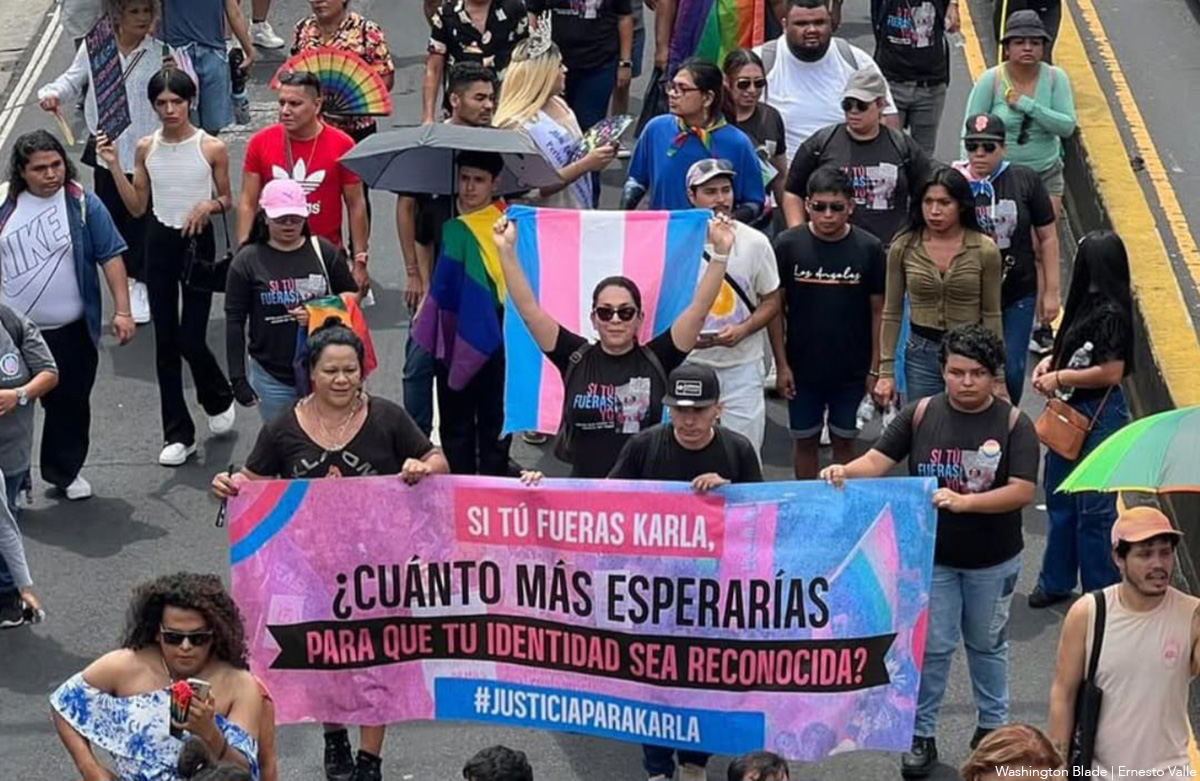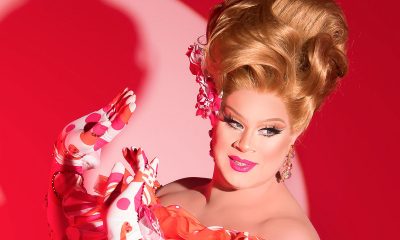World
Chilean president signs marriage equality law
Sebastián Piñera in June announced support for measure

Chilean President Sebastián Piñera on Thursday signed a law that extends marriage rights to same-sex couples in the South American country.
“Freedom, true freedom is always built when we recognize ourselves as equal in dignity and in rights and above all under the law,” he said during a signing ceremony that took place at the Presidential Palace in Santiago, the Chilean capital.
[EN VIVO] Pdte. @sebastianpinera, acompañado por ministras y ministros, subsecretarios, parlamentarios y representantes de la sociedad civil, promulga ley de #MatrimonioIgualitario. #AmorEsAmor 🏳️🌈 https://t.co/xamZ4tKdNQ
— Gobierno de Chile (@GobiernodeChile) December 9, 2021
The signing ceremony took place two days after the marriage equality law passed in the country’s Congress.
Movilh, a Chilean LGBTQ rights group, in 2012 filed a lawsuit with the Inter-American Commission on Human Rights on behalf of three same-sex couples who were seeking marriage rights.
The Inter-American Court of Human Rights in 2012 ruled in favor of Karen Atala, a Chilean judge who lost custody of her three daughters to her ex-husband because she is a lesbian. The landmark decision established a legal precedent that has been used to advance marriage rights for same-sex couples throughout Latin America.
A law that allows same-sex couples to enter into civil unions took effect in Chile in 2015.
The government of former President Michelle Bachelet — who is now the U.N. high commissioner for human rights — in 2016 said it would introduce bills to extend marriage and adoption rights to same-sex couples as part of an agreement between it, Movilh and the Inter-American Commission on Human Rights.
Movilh in 2020 withdrew from the agreement after it accused Piñera of not doing enough to advance marriage equality in Chile. Piñera in June announced his support of the issue.
“I celebrate marriage equality in Chile, which ensures recognition and protection for all families, without discrimination on the basis of sexual orientation or gender identity,” tweeted Bachelet on Wednesday. “It’s an important step for the country and I hope others will follow this example.”
I celebrate #MarriageEquality in Chile which ensures recognition & protection for all families, without discrimination on the basis of sexual orientation or gender identity. It’s an important step for the country and I hope others will follow this example.@free_equal 🏳️🌈 pic.twitter.com/ApliAtUyKu
— Michelle Bachelet (@mbachelet) December 8, 2021
Piñera signed the marriage equality law less than two weeks before the second round of Chile’s presidential election in which Congressman Gabriel Boric, who previously led a student protest movement, will face off against José Antonio Kast, a far-right former congressman. The marriage equality law will take effect before Piñera leaves office in March.
El Salvador
#JusticiaParaKarla: una lucha por el derecho a la identidad en El Salvador
Karla Guevara inició su camino legal y personal en 2020

Cinco años han pasado desde que Karla Guevara inició un camino legal y personal para lograr que su nombre y género sean reconocidos en su Documento Único de Identidad (DUI). Cinco años de sentencias, apelaciones, puertas cerradas y vulneraciones que hoy se resumen en una sola palabra: resistencia.
En medio de un país que aún arrastra estructuras jurídicas y sociales poco sensibles a las realidades trans, Guevara se ha convertido en una voz visible. No solo por la denuncia pública de su caso, sino por su capacidad de transformar el dolor en acción: ha iniciado la campaña #JusticiaParaKarla, la cual acompaña con conversatorios llamados “Si tú fueras yo” en diferentes zonas del país.
Su historia se remonta al año 2018, cuando, junto a otras tres defensoras de derechos humanos —Mónica Hernández, Bianca Rodríguez y Verónica López— interpuso una demanda para lograr el cambio de nombre legal. La acción se inspiró en la Opinión Consultiva 24/17 de la Corte Interamericana de Derechos Humanos, que obligó a los Estados miembros de la OEA a garantizar los derechos de las personas trans, incluyendo el reconocimiento de su identidad.
A diferencia de sus compañeras, cuyo proceso fue resuelto favorablemente, Guevara fue la única a quien el Estado salvadoreño le negó el derecho, incluso tras contar con una sentencia favorable. El camino ha sido empinado, desgastante y doloroso, y ha implicado múltiples etapas legales con resoluciones contradictorias.
El 8 de enero de 2020, el juzgado declaró su demanda improponible. Guevara apeló el 22 de ese mismo mes, pero la Cámara de Familia desestimó su recurso. Aun así, perseveró. En abril de 2021 presentó una segunda apelación, y en septiembre se revocó la decisión del juzgado, ordenando admitir su demanda. Una pequeña luz parecía abrirse.
En agosto de 2022, después de varios peritajes que, según Guevara, incluyeron momentos donde se sintió expuesta y violentada, recibió una sentencia favorable: se autorizaba su cambio de nombre y género en la partida de nacimiento. Sin embargo, esta victoria fue parcial y breve. Aunque se ordenó marginar su partida, no se ordenó cancelarla como en otros casos similares.
El 4 de octubre de ese mismo año, la sentencia fue enviada al Registro del Estado Familiar. Pero la respuesta institucional fue sorprendente: el 3 de noviembre, la Alcaldía de San Salvador se negó a realizar el cambio. El jefe del registro y el registrador presentaron un amparo ante la Sala de lo Constitucional, paralizando el proceso.
“No solo me lo negaron, sino que ahora me exponen a un juicio aún mayor”, expresa Guevara. La frustración y la indignación fueron creciendo. En febrero de 2023, presentó una denuncia ante la Fiscalía General de la República, aunque lo hizo con poca esperanza. “Temía que no harían nada”, dijo. Y el 16 de abril de 2024, sus temores se confirmaron: la Fiscalía archivó el caso alegando que “no existe delito que perseguir”.
El 19 de noviembre de ese mismo año, Guevara decidió acudir a instancias internacionales y presentó su caso ante la Comisión Interamericana de Derechos Humanos. La CIDH ya notificó al Estado salvadoreño y le otorgó un plazo de cuatro meses para responder por qué no ha ejecutado el cambio ordenado por el juzgado.
“Obviamente no van a dar respuesta”, lamenta Guevara. Lo dice con la voz entrecortada, como quien ya ha llorado mucho, pero no ha perdido la voluntad de hablar. Reconoce que el proceso le ha afectado emocionalmente. “Cada vez que hablo de esto se me corta la voz”.
Las heridas no solo vienen de las oficinas estatales, sino también de las calles. Las miradas, los comentarios, el momento de presentar el DUI en cualquier trámite. “Es como si cada vez tuviera que explicar mi existencia. Es un juicio constante sobre quién soy”.
Guevara no está sola. Reconoce que hay otras personas trans en la misma situación. “Lo preocupante es que solo pasa en algunas zonas del país. En otras ha habido casos exitosos”, afirma. La disparidad en el trato revela una preocupante arbitrariedad institucional.
Uno de esos casos exitosos es el de Valeria Mejía, coordinadora de monitoreo y evaluación de ASPIDH. Su DUI ya refleja su nombre identitario, aunque no su género.
“Cuando recibí mi DUI con el nombre que me identifico pensé: aquí empieza una nueva vida”, relata.
Para Mejía, el cambio fue profundamente simbólico. “Uno ve pasar toda su vida frente a los ojos. Toda la discriminación, todos los rechazos. Sentí que algo sanaba”. A pesar de ello, su género asignado al nacer sigue apareciendo en el documento, lo que le genera inseguridad.
“El problema es que tengo que ir a todas las instituciones donde aparezco con mi nombre anterior. En el Seguro Social, por ejemplo, aún estoy registrada con el nombre masculino y no pueden atenderme, aunque el número del DUI sea el mismo”, explica.
Casos como los de Guevara y Mejía visibilizan una problemática estructural: el Estado salvadoreño no garantiza de forma uniforme el derecho a la identidad de las personas trans. Las resoluciones favorables son solo el primer paso. Su implementación efectiva aún tropieza con prejuicios, burocracia y omisiones.
Con la campaña #JusticiaParaKarla, la activista busca más que una solución a su caso personal. Busca generar conciencia, exigir coherencia legal y empujar una transformación cultural. En la marcha del 17 de mayo contra la LGBTIfobia, su presencia se hizo notar con camisetas, banners y mensajes que interpelan directamente al sistema.
Guevara ha hecho de su cuerpo, su voz y su historia una herramienta de resistencia. En cada conversatorio de “Si tú fueras yo”, invita a imaginar, a empatizar, a incomodarse.
“Lo que me pasa a mí le puede pasar a cualquier persona trans. Y si el Estado no nos reconoce, nos niega también la posibilidad de existir plenamente”, expresa.
Hoy, la resolución está en manos de la CIDH y el tiempo corre. La lucha de Guevara ya no es solo por una partida de nacimiento. Es por el derecho a ser, a vivir sin miedo, a que el nombre que la representa no siga siendo un motivo de juicio, burla o rechazo.
Mientras tanto, sigue esperando. Sigue alzando la voz. Sigue sembrando esperanza en quienes vienen detrás. Porque como ella misma dice: “Esto no se trata solo de mí. Se trata de justicia”.
China
Female writers arrested in Chinese crackdown on gay erotic fiction
Pingping Anan Yongfu arrested last month, detailed ordeal on Weibo

On China’s Weibo, a platform akin to a digital town square, a young woman using the handle Pingping Anan Yongfu laid bare a harrowing ordeal. She was arrested and subjected to a humiliating strip search for publishing gay erotic fiction. Her raw and unsparing account exposed a broader clampdown.
Since February, at least 30 other writers — mostly women in their 20s — have shared similar stories of law enforcement raids, their lives upended for crafting “danmei,” a genre of male-male romance often laced with explicit themes, on Haitang Literature City and other platforms.
”I will never forget it — being escorted to the car in full view,” posted Pingping. “Enduring the humiliation of stripping naked for examination in front of strangers, putting on a vest for photos, sitting in the chair, shaking with fear, my heart pounding.”
A wave of legal limbo engulfs the writers, with many released on bail or awaiting trial, their fates uncertain, according to a BBC. Others remain behind bars, their detention a stark reminder of the crackdown’s reach.
Beyond those arrested, a broader net has been cast: scores of contributors to Haitang Literature City have been hauled in for interrogations, their online words now a potential liability under China’s pornography laws for producing and distributing obscene materials.
China’s pornography laws cast a long shadow over writers, with those profiting from their work facing prison terms exceeding a decade for crafting “explicit descriptions of gay sex or other sexual perversions.” Yet, heterosexual erotica often escapes such scrutiny, slipping through the cracks of enforcement. Nobel Laureate Mo Yan, whose novels brim with graphic sexual scenes, and Jia Pingwa, known for vivid depictions in works like “Abandoned Capital,” and other acclaimed writers continue to publish freely, their books lining shelves without fear of raids. This stark disparity underscores a selective crackdown, where gay erotica bears the brunt of official censure.
Beijing’s unease with the online outcry was palpable, as the trending hashtag #HaitangAuthorsArrested, which amassed more than 30 million views on Weibo, vanished abruptly under censorship’s heavy hand. Posts offering legal advice to the embattled writers were scrubbed, and a detailed report on the crackdown by Caixin, a leading Chinese news outlet, was swiftly taken offline. Writers’ accounts, including some of their pseudonymous handles, have also begun to disappear, erased from the digital landscape as authorities tighten their grip.
As her post ricocheted across China’s digital sphere, Pingping abruptly deleted it, replacing it with a brief message expressing gratitude to supporters while conceding she had broken the law. The admission, tinged with resignation, marked her final act on Weibo before she erased her account entirely, vanishing from the platform amid mounting pressure from authorities.
“Danmei,” a vibrant subgenre of Chinese fiction, centers on romantic and often sexually explicit relationships between men, captivating a largely female readership through its blend of emotional depth, fantasy, and forbidden desire. Rooted in Japanese “yaoi” or “boys’ love,” but distinctly shaped by Chinese cultural sensibilities, it flourishes on Haitang Literature City and JJWXC and other platforms where writers craft sprawling tales of historical, fantastical, or modern love that often laced with themes of power and sacrifice.
Despite its popularity — bolstered by blockbuster adaptations like “The Untamed,” which amassed millions of fans — “danmei” faces intense scrutiny in China, where authorities deem its explicit content “obscene” under vague pornography laws. This tension reflects a broader cultural clash: while “danmei” offers a space for exploring queer identities and challenging traditional gender norms, its underground allure draws both devoted fans and the wary eye of censors seeking to uphold conservative values.
A sweeping crackdown in late 2024 saw Chinese authorities prosecute roughly 50 “danmei” writers, ensnaring them in a legal dragnet under the country’s 2004 obscenity laws. Among them, Yuan Shang Bai Yun Jian, a prominent author who earned 1.85 million yuan ($250,874.58) from her work on Haitang Literature City, was sentenced to nearly five years in prison, her success weaponized as evidence of “obscene materials for profit.”
The harsh penalties, which outstrip those for some violent crimes, sparked outrage online, with netizens decrying the disproportionate punishment for crafting stories that, while explicit, harmed no one.
Chinese media regulator banned ‘danmei’ TV dramas in 2022
Humiliation washed over Pingping as law enforcement stormed into her college classroom, recounted a writer using the Weibo handle “Tianxia Ju Da Bingyuan” or “The World Is a Vast Asylum.” Dragged from her lecture under the stunned gazes of her peers, she endured a public spectacle as officers trailed her to her dormitory, rifling through her belongings in a search for evidence of her “danmei” stories, leaving her exposed and her privacy shattered.
“Danmei” novels, centered on male-male romance have spurred numerous Chinese television dramas, but state censorship has sharply reduced their output. A 2021 Sixth Tone report identified more than 60 “danmei”-based dramas in development or slated for release, involving actors who include Chen Feiyu and Fan Chengcheng. Many of them, however, were halted following the 2022 National Radio and Television Administration ban on such adaptations.
MyDramaList records 16 aired series, including “The Untamed” (2019) and “Word of Honor” (2021), each with 30–50 actors, totaling approximately 480–800 performers. Lead actors, including Xiao Zhan and Wang Yibo, earned $1–3 million per series, per The China Project, while others made $50,000–$100,000, though precise figures remain limited due to private contracts. The 2021 “Internet Clean-up Campaign” and continued restrictions have significantly curbed new “danmei” adaptations.
United Nations
UN Human Rights Council extends LGBTQ rights expert’s mandate
29 countries voted for resolution

The U.N. Human Rights Council on Monday extended the mandate of the United Nations’ independent LGBTQ rights expert for another three years.
The resolution passed with 29 countries (Albania, Belgium, Bolivia, Brazil, Bulgaria, Chile, Colombia, Costa Rica, Cuba, Cyprus, the Czech Republic, the Dominican Republic, France, Georgia, Germany, Iceland, Japan, Kenya, the Marshall Islands, Mexico, the Netherlands, North Macedonia, South Korea, Romania, South Africa, Spain, Switzerland, Thailand, and Vietnam) voting for it and 15 countries (Algeria, Bangladesh, Burundi, China, Cote d’Ivoire, Democratic Republic of Congo, Ethiopia, Gambia, Indonesia, Kuwait, Malawi, Maldives, Morocco, Qatar, and Sudan) voted against it.
Benin, Ghana, and Kyrgyzstan abstained.
The U.S. in February withdrew from the Human Rights Council. The Trump-Pence administration in 2018 pulled the U.S. from it. The U.S. in 2021 regained a seat on the Human Rights Council.
Graeme Reid has been the UN’s independent LGBTQ rights expert since 2023. The South African activist, among other things, previously ran Human Rights Watch’s LGBT Rights Program.
-

 Sports5 days ago
Sports5 days agoTrans cyclist’s victory sparks outrage in conservative media
-

 Congress5 days ago
Congress5 days agoCongress passes ‘Big, Beautiful Bill’ with massive cuts to health insurance coverage
-

 Israel5 days ago
Israel5 days agoActivist recalls experience in Tel Aviv after Israel-Iran war began
-

 Celebrity News5 days ago
Celebrity News5 days agoNina West’s ‘Sugar in the Tank’ tour comes to Rehoboth Beach











